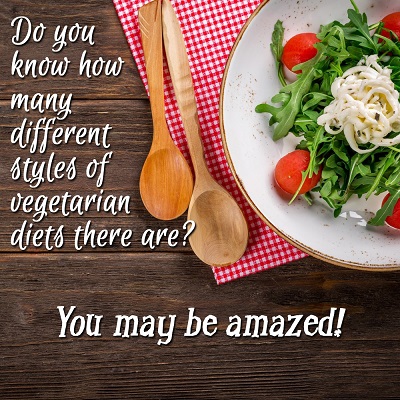 If we strictly define the word vegetarianism, it means a diet that is plant based and one that excludes meat, chicken and fish. However, due to the individual differences of many dieters, vegetarian diets have evolved to cater to the varied needs of its advocates.
If we strictly define the word vegetarianism, it means a diet that is plant based and one that excludes meat, chicken and fish. However, due to the individual differences of many dieters, vegetarian diets have evolved to cater to the varied needs of its advocates.
If you are thinking about changing your dietary habits, here are a few of the different types of vegetarian diets you may like to consider. There is possibly one that appeals and is more suitable to you and your lifestyle.
Vegan
A vegan diet is a very restrictive type of vegetarian diet. Many people choose to be vegans for ethical, health and environmental reasons, and prefer to tread the path of veganism as their way of promoting a more caring and humane world.
Vegans strictly prohibit the inclusion of all animal-based foods, including dairy products, honey and eggs. They also refuse to patronize all products that are made from materials that come from an animal, such as leather, fur, reptile skin and silk. Gelatin and other food ingredients, that may have traces of substances from animals, are also prohibited.
While this type of diet is considered to be a healthy one and also beneficial for the prevention of many diseases, it takes careful planning and preparation to ensure that you don’t become nutrient deficient.
Many of the important nutrients are easily obtained from animal-based foods such as iron, calcium and protein. Therefore, finding the right foods to replace these nutrients is vital for good health.
Lacto-vegetarian
Lacto-vegetarians still follow a vegetarian lifestyle, but unlike vegans, lacto-vegetarians will consume milk products, such as cheese and yogurt.
Lacto-ovo vegetarian
This vegetarian diet allows the consumption of eggs and dairy products. As lacto-ovo vegetarians consume these products regularly, they are less likely to develop problems with a protein and/or calcium deficiency. Compared to other types of vegetarian diet, this one is an easier protocol to adhere to.
Pescatarian
The pescatarian diet is one of the least restrictive vegetarian style diets. It allows you to consume fish, eggs and dairy products, while still avoiding all types of meat products. Some critics argue that pescatarians are not true vegetarians at all because they eat fish and seafoods.
Flexitarians
Some people tag a flexitarian as being a person that is not totally committed to following a vegetarian lifestyle. This is because flexitarians may consume meat on occasion. Some people prefer to start as a flexitarian to make it easier for their body to transition into a more restrictive type of vegetarian diet.
It certainly makes life simpler – allowing a person to focus on being a vegetarian most of the time, but not having to exclude themselves from situations where a vegetarian option may not be readily available.
Raw Vegetarian
This diet consists mostly of raw vegetables, seeds, nuts and fruits. Vegetarians who ‘go raw’ do not eat foods that have been heated above 115 degrees Fahrenheit. They believe that the cooking process destroys the important enzymes and nutrients found in foods.






